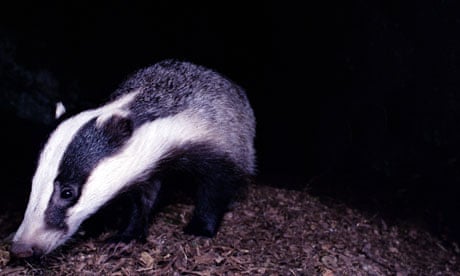A controversial cull of badgers in Wales is set to start imminently – before a final legal challenge by wildlife campaigners is heard in the court of appeal and despite incidences of bovine TB falling last year. The Pembrokeshire cull, aimed at preventing badgers infecting cattle, will be the first full-scale cull in Britain, following a series of pilot studies over the last decade.
The Badger Trust claimed that the Welsh assembly government could actually contribute to the spread of bovine TB if it had to halt the killing soon after it started. Both sides claimed scientific support from the same source for their positions.
The new coalition UK government is also planning targeted culls in south-west England, probably next year, reversing Labour decisions to rule out such action.
The trust lost a previous attempt to halt the Welsh cull but has now been granted leave to appeal at a hearing which its lawyer, Gwendolen Morgan of Bindmans, said "really is the last-chance saloon for the badgers". No date has been set for the appeal but it could be months before it is heard.
A spokesman for the government in Cardiff said: "It is our intention to begin to cull badgers in the intensive action pilot area in west Wales as soon as preparations are complete."
But David Williams, chair of the Badger trust, said: "If we win and the order to cull is quashed, a short-lived cull will mean an overall increase in cattle TB rather than any reduction."
Morgan also called on Welsh ministers "to pause for thought", saying: "Although it has largely passed under the radar, new cattle-focused measures are already beginning to make an impact in Wales and TB rates are quietly falling."
However, the assembly government says statistics for 2009 suggesting numbers of cattle killed in Wales and new herds put under restrictions because of bovine TB have fallen should be treated with caution. "TB is a long-term epidemic and historically the trend has been upwards. In 2006, the number of infected cattle dropped slightly, but by 2008, the cases of bovine TB in cattle had increased by over 100% from 6,000 to around 12,000."
A spokesman added: "It is too early to say yet whether the stricter cattle controls, increased testing and our zero-tolerance approach to not complying with regulations are making a difference yet."
The row over culling is becoming increasingly fraught, involving several reports and scientific papers.
One government-commissioned report, looking at nearly a decade of research including test culls, concluded in 2007 that badger culling could make "no meaningful contribution" to controlling bovine TB in Britain, while David King, then chief scientic adviser, concluded culling could work..
Last February, supporters of badgers seized on a study by experts at Imperial College and the Institute of Zoology in London, which suggested culling was "unlikely to contribute effectively to the control of cattle TB in Britain." However within months, researchers had updated their figures following the effects of the trial culls which Wales's chief vet, Christianne Glossop, said contradicted their original findings.

Comments (…)
Sign in or create your Guardian account to join the discussion